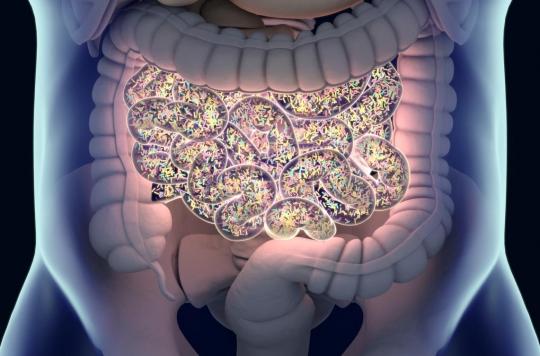Practicing intermittent fasting allows you to replenish your intestinal microbiota and thus reduce high blood pressure.

- Intermittent fasting (every other day) would remodel the intestinal microbiota and lower blood pressure.
- This is the first study to establish a link between fasting and lowering hypertension.
- Practicing fasting would notably make it possible to produce more bile acids, which contributes to a reduction in blood pressure.
In France, it is estimated that 10 to 15 million people are affected by arterial hypertension, ie one third of the adult population. Although frequent, this cardiovascular pathology must be taken seriously because it greatly increases the risk of developing complications such as stroke, myocardial infarction or kidney failure.
Several studies have already demonstrated that disruption of the gut microbiota, known as gut dysbiosis, can have negative effects on blood pressure.
A new study, conducted by researchers at Baylor College of Medicine in Houston, Texas, and published in the journal Traffic Researchshows for the first time that it is possible to reduce high blood pressure by remodeling the intestinal microbiota in an animal model.
According to Dr. David J. Durgan, first author of the study, “gut dysbiosis is not just a consequence of hypertension, it is actually implicated in its cause”. “This groundbreaking work led to the current study in which we proposed to answer two questions. First, can we manipulate the dysbiotic microbiota to prevent or alleviate hypertension? Second, how do gut microbes influence the animal’s blood pressure?”
A link between microbiota and high blood pressure
Researchers have already sought to find out whether manipulation of the microbiota can reduce high blood pressure. For this, they relied on previous research showing that fasting was both a major driver of gut microbiota composition and a promoter of beneficial cardiovascular effects. None of these studies, however, provided evidence linking the microbiota and blood pressure.
They worked on two types of rats: normal rodents and a so-called SHRSP model (spontaneously hypertensive rat prone to stroke), divided into two groups. The first group consisted of normal rats and SHRSP rats that were fed every other day, while the other group, called the control group, consisted of SHRSP rats and normal rats that had unrestricted access to food.
After nine weeks, the researchers found that the SHRSP rats in the control group had higher blood pressure than the normal rats. Interestingly, in the group that fasted every other day, rats in the SHRSP group had significantly reduced blood pressure compared to rats in the SHRSP group that were not fasted.
The researchers then investigated whether the microbiota was involved in the reduction in blood pressure observed in fasted SHRSP rats. To do this, they transplanted the microbiota of rats that had fasted or fed without restriction into germ-free rats, which do not have their own microbiota.
They were able to notice that the germ-free rats that received the microbiota from normally fed SHRSP rats had higher blood pressure than the germ-free rats that received the microbiota from normal control rats. “It was particularly interesting to see that the germ-free rats that had received the microbiota from fasted SHRSP rats had significantly lower blood pressure than the rats that had received the microbiota from SHRSP control rats. These results demonstrated that the alterations in microbiota induced by fasting were sufficient to mediate the hypotensive effect of intermittent fasting.”
How the microbiota regulates blood pressure
But how does the intestinal microbiota intervene to regulate blood pressure? To find out, the researchers conducted whole-genome analyzes of the microbiota and found that hypertensive rats in the SHRSP model that were fed normally had less bile acids in circulation than animals without high blood pressure. In contrast, SHRSP animals that were on an intermittent feeding schedule had more bile acids in circulation.
“In support of this finding, we found that supplementing animals with cholic acid, a primary bile acid, also significantly reduced blood pressure in the SHRSP model of hypertension”points out Dr. Durgan.
According to him, this study is important for understanding that fasting can have positive effects on the intestinal microbiota, which itself has a role to play in reducing high blood pressure. “Intermittent fasting programs may help regulate the activity of gut microbial populations to provide natural health benefits”he concludes.

.















